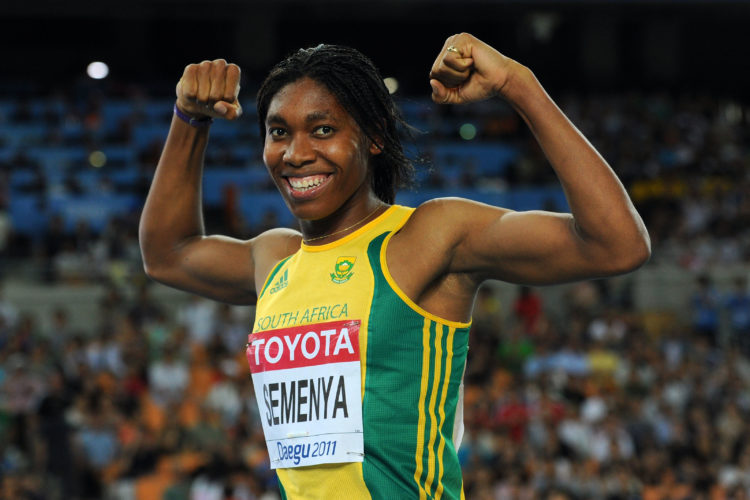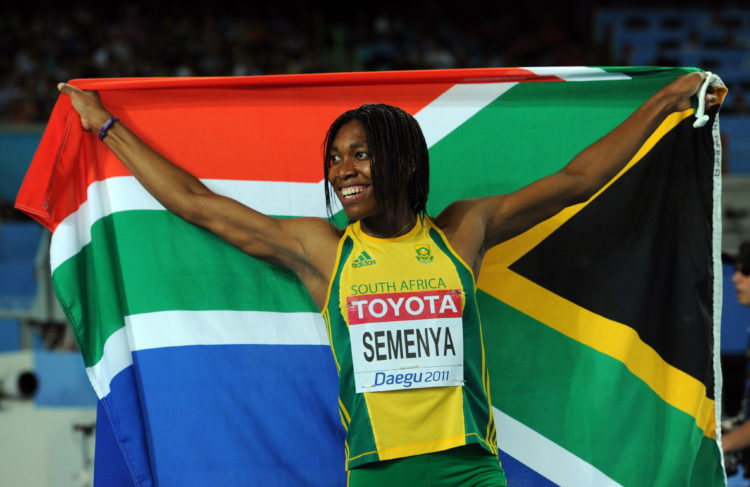As Caster Semenya took to the track in the Herculis Monaco Diamond League, I brimmed with confidence and happiness that my fellow South African was back and ready to silence her critics. And she blew the field away.
The 800m race was not only her personal best time, but also a South African national record which now stood at a modest 1:55:33 in the event. The patriot in me was more than proud of her exploits, yet the sentiment did not resonate in others like I expected.
Instead of celebrating this achievement in anticipation for the 2016 Rio Olympics, her victory was met with mixed emotions. It was a throwback to 2009 when her gender was publicly questioned. It felt like, yet again, Caster Semenya was losing her identity in the midst of intense media scrutiny.
When the world was at her feet, the first of many controversies that the young Semenya would face reared its head.
Semenya was born on January 7, 1991 near Polokwane. She burst into the athletics scene in 2008, claiming gold in the 800m event at the 2008 Commonwealth Youth Games. A year later, her superb running abilities were again on show at the African Junior Championships; she won both the 800m and 1500m races. But when the world was at her feet, the first of many controversies that the young Semenya would face reared its head.

National, as well as international, headlines did not attribute her improvement to hard work and hours of training, but rather questioned her gender. They focused on her overall physical appearance and her superior speed to the other female athletes. Rumours were thrown around of her not being entirely female, thus having to potentially face disqualification. Speculations quickly developed into allegations.
When officials from the International Association of Athletics (IAAF) claimed that gender tests were not mandatory, it left Caster Semenya, a teenager, with the task of fending off these intrusive allegations against her. A daunting task for an individual who had, for her entire life, identified herself as a girl. She then underwent rigorous tests to confirm her gender and hopefully to put an end to scrutiny.

But gender tests try to establish a distinct gender binary – either male or female. And this can be problematic. The gender binary attempts to divide people into one of the two gender groups, but it constructs false expectations of things one must have in order to be considered male or female. Because Caster Semenya possessed certain ‘masculine’ characteristics, such as her physical appearance and deeper voice, in comparison to the other female athletes, that immediately led to the allegations of her being a male.
Wherever Caster went she was met with words of encouragement, cheers, and excited fans itching to get a picture with a national icon.
This flawed train of thought sparked an outrage, so much so that Semenya’s mother, Dorcus Semenya, had the following to say in defence of her daughter in an interview on a documentary by Kuchu Times: ‘When they started saying she’s not a girl and she’s a boy, I never had a problem. I gave birth to her and, as a mother, know that she’s a girl and not a boy’. Yet one cannot escape the psychological effect that this saga had on Caster. There were growing doubts on whether she would ever race again, and if she did, would it be as a male or female (yes, that was surprisingly speculated). In the same documentary by Kuchu Times, Caster was filmed saying that she no longer cares about athletics or running – it was a heartbreaking moment for a young, black woman with immense abilities.
But she is still South Africa’s darling. Wherever Caster went she was met with words of encouragement, cheers, and excited fans itching to get a picture with a national icon. It was ‘Ubuntu’ in practice as people showed their humanity to this young woman. In 2010 the IAAF cleared Semenya to return to international competition.
Caster Semenya sparked a special reaction. She rose against all odds to illustrate that there should not be a standard that any female should live by in order to be who they are. Despite all of the public shaming and humiliation she displayed courage and tenacity to get back to the track and do what she loves. Her strength transcends athletics, and she stands as an example to young girls around the globe who do not necessarily conform to what society deems a female. In a career that is largely dominated by her male counterparts, she has displayed a mentality that many of them could learn from.
https://twitter.com/Themightycaster/status/658330365589897216
People may think female athletes receive the same opportunities as men, but there are still discrepancies in the facilities that they are given, the pay, as well as the coverage that they get. Female athletes have to deal with prevalent sexist and stereotypic attitudes. So, when a female athlete, such as Caster Semenya or Serena Williams, cannot only recover from, but challenge these notions of what a female athlete should be, they are sure to captivate the world.
During apartheid, heroes came in the form of individuals who fought for freedom and opposed segregation.
Black women are, arguably, the most marginalised group in society. The issues they face smother their individuality. They are familiar with racism, and sexism. One can only speculate: would the case been handle differently if she was white? Would she have had to undergo the tests if she was white? Would it have been handled in a more sensitive manner?

During apartheid, heroes came in the form of individuals who fought for freedom and opposed segregation. Likewise, today’s icons are people who push boundaries and rise in the face of adversity. She founded the Caster Semenya Foundation through which she assists in training young athletes from disadvantaged backgrounds; her values and experiences are passed on to budding athletes. As she said on the documentary 21 ICONS, ‘You can’t wait for someone to push you – you have to know your game. I think that’s what made me survive.’
Whether we like it or not female athletes will, in most cases, be subject to intense scrutiny. This scrutiny is not solely focused on sportsmen and women’s ability and performance but digs deeper, sometimes intrusively. In a world that is ever changing, identity cannot remain stagnant but it can always remain yours. If there is one thing that we can learn from Caster Semenya, it is to hold on and stay true to your identity: it is one of the few things that nobody can take from you.
I’ll be cheering her on at Rio.
